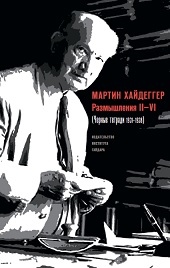Reflections II-VI (Black Notebooks 1931–1938)

Martin Heidegger
Überlegungen II–VI (Schwarze Hefte 1931–1938)
Translated to Russian by A. Grigoriev; under scientific editing by M. Mayatsky. Moscow, Gaidar Institute Press, 2016. – 584 p.
ISBN 978-5-93255-465-4
The publisher of the Black notebooks, Peter Travny, described Heidegger's reflections in this way, based on his own self – assessment: they are not "aphorisms" as evidence of "worldly wisdom", but "inconspicuous outposts – and rearguard positions"– in a holistic attempt to win the way for initial questioning, which, in contrast to the metaphysical, calls itself Existential-historical thinking. This method is applied by the philosopher to the situation in religion, art, and science.
Black notebooks is a thinker's workshop: many of the notes will grow into articles, reports, and book chapters. In addition to philosophical questions, Heidegger makes sense of the situation in Germany after the Nazis came to power. In particular, he comments on his tenure as rector of the University of Freiburg and in connection with it all his complex attitude to national socialism. It is no coincidence that the publication of the Black notebooks caused a fierce controversy in Germany and other countries.